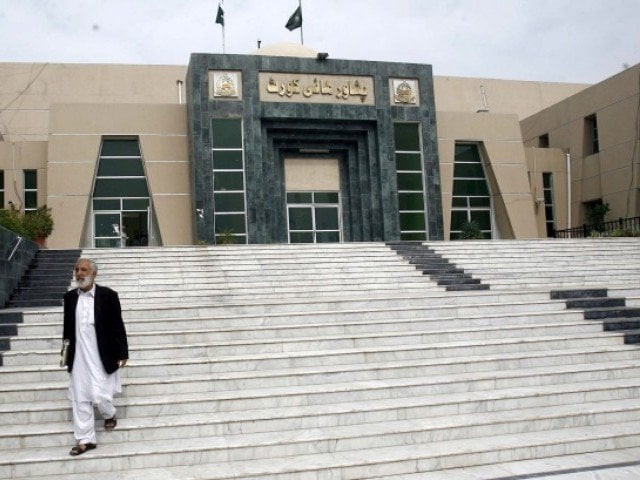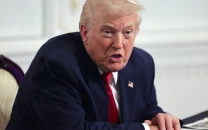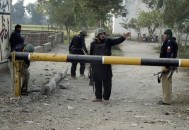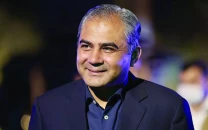PHC suspends MDCAT results temporarily
K-P govt forms JIT to probe into use of covert Bluetooth devices for cheating during tests

The Peshawar High Court (PHC) on Friday ordered to withhold the Medical and Dental College Admission Test (MDCAT) results on petitions filed by students regarding the use of covert Bluetooth devices for cheating in the examination hall.
The court issued orders to the chief secretary, executive director of the Education Test and Evaluation Agency (ETEA), and the registrar of the Pakistan Medical and Dental Council (PMDC) to provide responses regarding these allegations.
Additionally, the court temporarily prohibited the ETEA from publishing the official results on its website pending further investigation.
Justice Syed Arshad Ali of the PHC presided over the hearing of the cases pertaining to the use of covert Bluetooth devices for cheating in the MDCAT.
The court said that the MDCAT results should not be uploaded on the official website till the next hearing. Later, the court adjourned the hearing till Sept 21.
The action was initiated in response to the complaints regarding the MDCAT results submitted by concerned parents and students to the Human Rights Cell in Peshawar.
Read MDCAT exam: bluetooth devices confiscated
These applications were subsequently forwarded to the PHC chief justice and were assigned to Justice Arshad Ali for adjudication.
The applicants raised grave concerns regarding the widespread use of covert Bluetooth devices for cheating during the MDCAT. They asserted that the Khyber-Pakhtunkhwa (K-P) chief secretary acknowledged the existence of such malpractices, yet no substantive action had been taken to address the issue.
The applicants contended that approximately 200 students were apprehended with Bluetooth devices during the examination. Consequently, they petitioned the court to order a re-conduct of the test and impose strict penalties on those who were involved in the use of unfair means.
The court, in response, issued a preliminary order, directing the concerned authorities to submit detailed responses.
Further, the K-P government formed a joint investigation team to probe into the use of covert Bluetooth devices in the
MDCAT on the protests by parents and submit its report within a week.
According to sources, the K-P Interior and Tribal Affairs Department formed a seven-member JIT.
According to a notification, the IG special branch would be the chairman of the JIT and higher education special secretary, special secretary health, Home Department additional secretary, representatives of Intelligence Bureau and Khyber Medical University its members.
On Sept 10, K-P Chief Secretary Nadeem Aslam Chaudhry took a firm stance against attempts to employ dishonest tactics during the MDCAT.
It came to light that certain candidates were caught attempting to use Bluetooth-enabled, pocket-sized devices connected to micro earpieces during the examination.
Over 40 students were apprehended, both before entering the examination halls and within various test centres. Authorities promptly confiscated these electronic devices, and the candidature of the implicated students was subsequently invalidated.
The issue of dishonest means in standardised tests was not confined to K-P alone. In Karachi, allegations of paper leaks prior to the MDCAT prompted action.
Jinnah Sindh Medical University (JSMU) Vice Chancellor Prof Amjad Siraj Memon established a committee to investigate these allegations.
The committee includes representatives from various authorities, including the PMDC regional office and the Federal Investigation Agency’s Cyber Crime Wing. The committee is mandated to submit its findings within a week after conducting a thorough inquiry.
On Friday, PMDC President Prof Dr Rizwan Taj conducted a post-examination analysis meeting of the MDCAT 2023 to assess the holding of the examination process, hurdles in the compilation of results, and difficulty index.
The meeting started with a review of the performance of individual exam questions, difficulty index, and whether any question appeared ambiguous or confusing.
During the meeting, feedback and issues from the candidates were also considered.
It was learned during the meaning that in the MDCAT, there were a few out-of-syllabus questions in some provinces on which the PMDC president took notice of the same.
The PMDC president directed vice chancellors of all public universities to re-check their question papers and analyse any discrepancy found in the paper which may be addressed at the earliest.
He added that universities must take serious action and hold inquiries against all those who were involved in using unfair means in the examination with substantial proof.
He stated that transparency must be ensured and all issues related to the exam must be addressed on a priority basis without any delay.
The PMDC president said that the meeting held crucial importance for evaluating the effectiveness of the test and making improvements.
During the meeting, Prof Taj showed serious concern, inquiring regarding the news in the media about the MDCAT paper and its authenticity.
Separately, the University of Health Sciences (UHS) on Friday announced the MDCAT 2023 results, according to which more than 96 per cent of the students secured good marks.
According to the UHS spokesperson, the test for admission to medical and dental colleges in Punjab was conducted on Sept 10, the results of which had now been released on the website.
According to the spokesperson, candidates could check the result by entering their roll number and name.
According to the PMDC, the MDCAT for medical admissions had 55% passing marks and MDCAT for dental college admissions had 50% marks.
A total of 65,221 candidates participated in Punjab, of which 54,131 secured more than 50% marks, while the percentage of students who secured 193 marks out of 200 was 96.50%.



















COMMENTS
Comments are moderated and generally will be posted if they are on-topic and not abusive.
For more information, please see our Comments FAQ